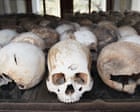
In a world increasingly focused on reconciliation and preservation, recent developments highlight key movements addressing historical legacy, societal equity, and national security. Insights from Cambodia, Australia, and France offer a glimpse into these efforts.
Unesco’s recent decision to inscribe three Cambodian sites associated with the dark chapter of the Khmer Rouge onto its World Heritage List marks a thoughtful step towards recognizing the importance of remembering the past. This decision coincides with the 50th anniversary of the regime’s rise to power, serving as both a sobering reminder and an opportunity for reflection. The inscriptions were made official during the 47th session of the World Heritage Committee in Paris, underscoring a global commitment to preserving historical truths as integral elements of collective memory. These sites, once grim locations of torture and execution, now stand as places for contemplation and education, fostering a future where such tragedies are not repeated.
Meanwhile, in Australia, the intricate balance between addressing antisemitism and fostering a wider culture of anti-racism education has sparked constructive debates. Labor Friends of Palestine, a group within Australia’s political landscape, has voiced concerns about adopting the International Holocaust Remembrance Alliance’s definition of antisemitism, recommending instead a focus on inclusive educational frameworks. This dialogue illustrates a conscientious approach to policy-making that respects diverse perspectives and seeks harmony through education and awareness. Such discourse, if approached thoughtfully, can contribute to a robust and inclusive societal ethos.
In Sydney, the story of Renee Bani, an Indigenous midwife who left her position at the Royal Prince Alfred hospital due to racial discrimination, highlights the ongoing need for culturally safe work environments. Her experience underscores the importance of systems that not only recognize but actively respect and incorporate cultural diversity within their core operations. This ensures that all workers can contribute meaningfully and thrive without prejudice, ultimately enhancing the quality of care provided.
The historical narrative is similarly explored through the lens of France, where President Emmanuel Macron’s address to the Armed Forces articulated concerns about the current geopolitical climate. Emphasizing the value of safeguarding freedom, Macron advocates for a bolstered defense budget to meet emerging threats. His vision of increased investment by 2027 aims to secure national integrity while ensuring France is prepared and adaptable. This strategic foresight appreciates the nuanced challenges of modern security while underscoring a commitment to both national and global peacekeeping efforts.
Finally, Malika Rahal’s work as a historian delves into sensitive topics such as colonial history, illustrating how the past’s complexities can inform current understanding. She navigates the delicate interplay between history and memory, highlighting stories that offer profound insights into present-day cultural identity and collective memory.
Together these stories form a tapestry of global and regional efforts that seek not only to preserve and remember but to inform and inspire. As these developments unfold, they invite us to envision a world where understanding and inclusivity are foundational principles guiding policy and human interaction. Whether through preserving history, advocating for respectful dialogue, or fostering culturally safe spaces, each initiative contributes critically towards a more harmonious and informed global community.
Source: {link}
